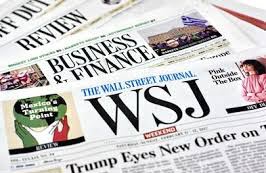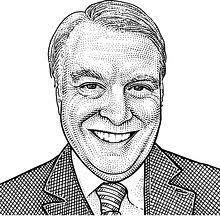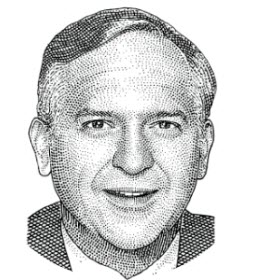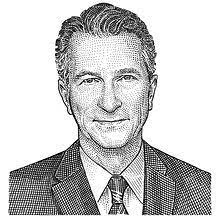The Other Big Lie the Wall Street Journal Wants You to Believe
Dec 17 2021Every expectation is that Donald Trump will run for re-election in 2024. A multifaceted strategy to assure his win no matter that election's outcome — dubbed a "slow motion coup" by those on the left
— is on the move to make that happen. To fortify that outcome, Trump's legions are conducting a parallel campaign that seeks to rewrite recent history.
![]() There is first the "Big Lie", entirely the creation of the ousted president and still believed by two-thirds of Republicans, that the 2020 election was stolen from Trump and that Joe Biden is per force an illegitimate president.
There is first the "Big Lie", entirely the creation of the ousted president and still believed by two-thirds of Republicans, that the 2020 election was stolen from Trump and that Joe Biden is per force an illegitimate president.
![]() Second, a movement to downplay the insurrection swelled as the months passed after January 6. It became just another protest that got out of hand, no different than Portland's riots, and a false flag operation at that, with antifa members dressed to impersonate right-wing militias.
Second, a movement to downplay the insurrection swelled as the months passed after January 6. It became just another protest that got out of hand, no different than Portland's riots, and a false flag operation at that, with antifa members dressed to impersonate right-wing militias.
![]() A third front to negate "the Russia narrative" hopes to entirely sanitize, if not disappear, the accusations of contacts with Russians during the 2016 Trump campaign, burying these allegations as no more than a left-wing-promoted "hoax".
A third front to negate "the Russia narrative" hopes to entirely sanitize, if not disappear, the accusations of contacts with Russians during the 2016 Trump campaign, burying these allegations as no more than a left-wing-promoted "hoax".
This last became a story again with recent indictments by special counsel John Durham, who had been assigned by Trump's Attorney General William Barr to determine whether the FBI was justified in investigating the Russian contacts. Principal among the indicted is Igor Danchenko, a Russian citizen long in the U.S., who had been revealed as the prime source of Christopher Steele's "dossier", and is now charged with lying to the FBI.
Filled with uncorroborated claims of Trump ties to Russia, the Kremlin's plan to help him win the election, and salacious episodes with prostitutes, the dossier was a bombshell for its having been covertly funded by Hillary Clinton's campaign. The scandal was compounded when the FBI used it as a principal document to obtain clearance from the secret FISA court for surveillance of Carter Page, a foreign policy adviser to Trump during the Trump campaign.
name callingThe dossier was a bonanza for Trump and Republicans. It gave them a cause célèbre to divert attention from the the peculiar deference Trump showed to Russia President Vladimir Putin and the numerous reports of contacts with Russians by Trump campaign members. That way, given the dossier's disrepute, they could attempt to claim the FBI and Mueller investigations were a "Russia hoax".
The news pages of The Wall Street Journal enjoy a respectable reputation for relatively unbiased reporting. But that undergoes a sudden change once one gets to the editorial and opinion columns. What is remarkable is that this clutch of writers are so invested in disclaiming any of the bewildering Trump campaign's Russian interactions that they have become no more than propagandists. To this day they refer dismissively to the "Russia-collusion narrative", "Russia collusion fraud", "Russia-collusion fiction", "the Russia collusion canard", "the collusion hoax", and so on. They are careful to use the word "collusion", a term not recognized in law where conspiracy and coordination are the preferred words, because while the media, in its probe of Russia campaign connections and election interference, may have suspected collusion and sought to find it, they did not find and did not conclude in their reporting that there was actual collusion.
The folks at the Journal do not make that distinction. That would require them to recognize the long timeline of puzzling Russia-tinted goings on that went right to the edge of collusion.
never should have happened
The Mueller report could not accuse Trump and his campaign team of conspiring with Russia during the 2016 election, but neither did it "exonerate" Trump. Yet columnist Kimberly Strassel wrote that 
Kimberley Strassel
the report was "more than an exoneration" [her emphasis]. "None of this should ever have happened absent highly compelling evidence — from the start — of wrongdoing". For her, evidence of wrongdoing must somehow precede an investigation that looks for evidence. Fellow columnist Daniel Henninger as late as this past May wrote, "The Russia-collusion narrative — that Mr. Trump and his campaign had been politically compromised by Vladimir Putin — was false…accusations that — we know now — were far-fetched from day one", a denial of Russia's proven election interference. Just after the Mueller report came out, Holman Jenkins, maybe the most senior Journal columnist, given his top-of-page billing, went to the extreme of 
Holman Jenkins
averring "the Trump campaign's nonexistent Russian connections" and asking, "Why did the FBI fan a Russia collusion confabulation that it knew was unfounded, false, and baseless?".
By such total nullification they've said that the FBI should never have looked into Russian election interference or the hacking of the Democratic National Committee servers. Mueller should have ignored finding out who was behind Russia's "Active Measures" social media campaign and GRU's (Russia's military intelligence unit) hacking operations. They should have just shrugged it off.
Here's what the Journal opinion pages want you to believe:
there was only the dossierMs Strassel wrote obsessively of the dossier. She wanted her readers to think of the "collusion narrative as a political dirty trick aided by a rogue FBI" in a bid to make the dossier the source of all reports of Russia ties. That had become the playbook for the White House, right-wing media, and Republicans in general, and the Journal opinion pages bought in. Any mention of Russia involvement in the election campaign was to be steered straightaway to the FBI's dossier debacle, as if it were the entirety of the Russia story. In November 2017, Strassel writes:
"[I]t is fair to ask if the entire Trump-Russia narrative — which has played a central role in our political discourse for a year… — is based on nothing more than a political smear document."
This had become the new "truth" as explained by Henninger in April 2019:
"On Jan. 10, 2017…BuzzFeed published the text of the Steele dossier. Simultaneously, most of the U.S. media began
Daniel Henninger
running stories based on anonymous intelligence sources suggesting the possibility of a link during the previous year’s election between U.S. President-elect Trump and Vladimir Putin."
Thus, in Henninger's formulation, no one knew anything until Buzzfeed published the dossier in early 2017. Not true. The extraordinary reporting of 2016 campaign personnel and their Russia intersects began in The New York Times, The Washington Post, and ultimately even his own paper, in the summer of 2016 in the thick of the campaign. But this needed to be disappeared so that Henninger could source the totality of the media's "Russia-collusion narrative" to the ignominious dossier and become Donald Trump's "fake news".
In fact, shoe-leather reporting identified so much about the Trump campaign and its Russia contacts that, by the time the Mueller report was released in the spring of 2019, it offered very little that that newspaper reporters in particular had not already uncovered.
The Journal's opinion writers' desire to subvert the history relies on our forgetting it. If you'd like a quick list of what the press uncovered, take this side trip and return here.
the dossier triggered fbi's probeWhen the Justice Department's inspector general's report on the FBI's investigation came out in December 2019, Ms Strassel was anxious to make the dossier the reason for the FBI's launch of Crossfire Hurricane, the codename for its investigation into the Trump campaign's Russian contacts and Russian election interference. That, she hoped, would invalidate both the FBI inquiry and the Mueller probe that took over, as in "fruit of the poisonous tree".
She quotes not the report — it inconveniently said, "the agency’s decision to open an investigation into the campaign’s ties with Russia was warranted and not motivated by politics" — but Bill Barr's opinion of it when she writes in January 2020:
"Journalists and Democrats were particularly hysterical when Mr. Barr stated 'The Inspector General’s report now makes clear that the FBI launched an intrusive investigation of a U.S. presidential campaign on the thinnest of suspicions that, in my view, were insufficient to justify the steps taken'."
Barr is referring to the Steele dossier; two sentences later he writes of the "rush to obtain and maintain FISA surveillance of Trump campaign".
Barr's linking the dossier to the FBI starting its investigation, just as Trump wanted all to believe, is unfounded, but fits Ms Strassel's mission. She wrestles with the timeline to make that so. In November 2017 she writes, " Mr. Steele, by his own admission (in an interview with Mother Jones) … gave his dossier in July 2016 to the FBI.". The FBI began its investigation July 31, 2016.
Just this November she was still at it:
"The nation argued for five years over the infamous 'Steele dossier', the document on which the Federal Bureau of Investigation relied to investigate Donald Trump’s 2016 campaign."
It is Ms Strassel who is arguing; in all this time she has written of little else while the world moved on. In fact, Christopher Steele's dossier was viewed as suspect from the start. As witness, note that no one seems to have set about trying to prove its contents. It is the sort of document that journalists shy from endorsing. (For the record, though, some of it proved correct, notably that there was a major Kremlin effort to interfere in our elections to help Trump's campaign.)
About the FBI receiving the Steele document in July and relying on it to start its investigation? She could have found out if she chose to that the truth is otherwise. Concerned for the Russian interference his sources were reporting, Steele gave a copy to an FBI agent in Rome where he had been working, who sent it to the the FBI's New York's criminal prosecution office. There it sat for a couple of months with the wrong agents who didn't know what to do with it. “Steele's reporting did not reach the counterintelligence team investigating Russia at FBI headquarters until mid-September 2016, more than seven weeks after the FBI opened its investigation", according to ABC News and multiple sources. The FBI investigation was triggered by reports that the Russians were sitting on thousands of Clinton campaign e-mails (here's a link to our list again).
Hillary Clinton was the Russian conspirator"Durham Unravels the Russia Case" was the title of an editorial at the beginning of this November after John Durham indicted Igor Danchenko for repeated lying to the FBI. Danchenko had earlier been unearthed as the principal contributor to Steele's dossier.
The purported "unraveling" only brought to light a new figure, John Dolan, a public relations executive who had extensive ties to the Kremli, was well known to Russia experts such as Fiona Hill, and “frequently interacted with senior Russian Federation leadership”, according to the Durham indictment. So now in addition to the Clinton campaign paying Fusion GPS through a law firm to develop opposition research, which contracted with Christopher Steele, who relied on Igor Danchenko, there was John Dolan, who provided Danchenko with material he got from Russians.
After years, this and one other indictment, again for lying to the FBI, is all Durham has come up with. Nevertheless, Kimberly Strassel went overboard with this news, opening her November 11 column with:
Special counsel John Durham’s indictments have turned any number of narratives on their heads, including the question of which 2016 presidential campaign was in bed with Russians. It wasn’t Donald Trump’s."
The editorial page seconded with:
"The country spent years obsessing over the Trump conspiracy that didn’t exist — rather than the Clinton conspiracy that did."
Strassel asks us to:
"Contrast this to the many Russians routinely interacting with Hillary Clinton campaign contractors and surrogates, as documented by Mr. Durham’s latest indictment."
She will now undoubtedly be dropping this new bit of demagoguery into her column — that it's now the Clinton-Russia connection, not Trump — and sure enough, she just did. On December 9, in a completely unrelated column on Merrick Garland, we have "...and Hillary Clinton's great Russia-collusion hoax".
Except that unlike the Trump campaign that had direct contacts with Russians — the Mueller report counted 140 between Trump and 18 of his associates — all of this took place at arm's length from the Clinton campaign, and there is no sign of "many Russians routinely interacting". Did the Clinton camp even know of the Fusion GPS hire, Christopher Steele? As last link in the chain, Dolan says, “Individuals affiliated with the Clinton Campaign did not direct, and were not aware of” his meetings with Russian nationals, or so he says. The Journal had to admit:
" Whether or not Mrs. Clinton was aware of any of this, there is no question her campaign got a Russian assist."
None of Durham's indictments went beyond the Steele episode, yet for Henninger this was somehow, "the Russia-collusion narrative, which prosecutor John Durham is — to choose a word at random — debunking." The editorial board went for broke, hoping to erase even Russia's interference in the 2016 election, writing of the…
"Russia collusion narrative from 2016, which the press flogged for more than two years but we now know was concocted by the Hillary Clinton campaign. We also now know that the Russian email disinformation story was false."
Russian interference erased.
PostscriptThe Journal's editorials have been steadfast in their contention that Trump lost the 2020 election and not through fraud. It was dirty tricks that won out. The examples cited above are from many more that could have been added to this article.
The editorial writers and opinion columnists are a static crew — Paul Gigot has led the section for two decades — 
Paul Gigot
with no change in their ranks in years other than the recent addition of Denmark's Bjørn Lomborg whose job it is to write a weekly column that downplays climate change. He usually does so by finding incidents of phenomena — storms, wildfires, etc. — in years past that match or exceed those of today, and by assuring us that warming will make little difference anyway.
In July of 2020, 280 journalists and other staffers in the newsroom had enough. They signed a letter to the paper's new publisher calling out the opinion section's "lack of fact-checking and transparency, and its apparent disregard for evidence" that serves to "undermine our readers' trust and our ability to gain credibility with sources".
The editorial board resorted to arrogance in response, writing to readers rather than its own reporters saying, "their anxieties aren't our responsibility" and...
"it was probably inevitable that the wave of progressive cancel culture would arrive at the Journal as it has at nearly every other cultural, business, academic and journalistic institution."
The board would go on to publish this October a close to 900-word letter from Donald Trump in which he lists twenty instances of phantom people, late ballots, dead and underage voters, duplicate registrations, etc., totaling 931,530 fraudulent votes, plus "hundreds of thousands" more "unlawfully counted in secret". And this was just Pennsylvania.
Roundly criticized, the board responded with, "The progressive parsons of the press are aflutter that we published" the letter. Realizing how far out on a limb they had gone, though, they backtracked by refuting some of the fraud claims in various states. But the editors closed with barbs against other media for failing "to examine their own standards after they fell so easily for false Russian collusion claims". This breezed past the Republican-run Senate Intelligence Committee report that two months earlier showed the unequivocal collusion between pardoned Paul Manafort and Russian intelligence officer Kilimnik that the committee called "a grave counterintelligence threat" and Trump's involvement with Roger Stone, WikiLeaks, and Russia's help with stolen Clinton e-mail.
Please subscribe if you haven't, or post a comment below about this article, or
click here to go to our front page.


